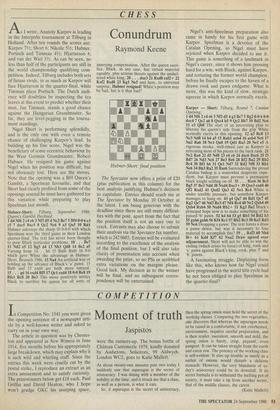COMPETITION
Moment of truth
Jaspistos
In Competition No. 1541 you were given the opening sentence of a newspaper arti- cle by a well-known writer and asked to carry on in your own way.
The article in question was by Chester- ton and appeared in New Witness in June 1914, five months before his appropriately large breakdown, which may explain why it is such wild and whirling stuff. Since the entries this week were cruelly cut by the postal strike, I reproduce an extract as an extra amusement and to satisfy curiosity. The prizewinners below get £18 each. Paul Griffin and David Heaton, who I hope won't grudge GKC his usurping space, were the runners-up. The bonus bottle of Château Cantemerle 1979, kindly donated by Asshetons, Solicitors, 99 Aldwych, London WC2, goes to Katie Mallett.
At about twenty-one minutes past two today I suddenly saw that asparagus is the secret of aristocracy. I was dining with a member of the nobility at the time, and it struck me that a class, as well as a person, is what it eats.
So, if asparagus is the secret of aristocracy, then the spring onion must hold the secret of the working classes. Comparing the two vegetables, one discovers that whereas the asparagus needs to be raised in a comfortable, if not overheated, environment, requires careful preparation, and is then tender, succulent, smooth and mild, the spring onion is hardy, crisp, piquant, even pungent. It can be taken straight from the earth and eaten raw. The potency of the working class is self-evident. It stirs up trouble as surely as a surfeit of onions would disturb a delicate stomach. However, the very blandness of to- day's aristocracy could be its downfall. If its secret formula is to withstand the melting pot of society, it must take a tip from another secret, that of the middle classes, the carrot.
(Katie Mallett)
At about twenty-one minutes past two today I suddenly saw that asparagus is the secret of aristocracy. At ten minutes to five it began to dawn on me that melons are the sine qua non of the middle classes, and pomegranates the pre- serve of the plebs. At three minutes past five Maud brought me a plate of fried eel au gratin (with side dish of asparagus) and I knew I had to rewrite that first sentence again. At sixteen past six I slowly discovered that aspic is the essence of the Aristotelian and of the arriviste. (That's better!) At about seven past seven I received a phone call alerting me to the fact that egg-nogs have an edge with the epicurean and that custard is the curse of the commonalty. (A side remark of Maud's: 'Do the rich refry rice?') The cognoscenti go for cocoa and the effete advocate anchovies. I don't know what socialists like (sauce?), but I can boast that the Tories like
quails' eggs on toast. (John O'Byrne) At about twenty-one minutes past two today I suddenly saw that asparagus is the secret of aristocracy and that I had drawn the falsest of conclusions from the evidence. Of course that vast store of asparagus in the cellars of the House of Commons was not an attempt by Members to corner the market. Of course that cryptic note on House of Lords paper, 'Check that Commons sprinkler system works', was not a disinterested concern for the other House. Even the disguised voice from the Palace saying that at three o'clock MPs' pay would be discus- sed became significant; the House would be full.
There was not much time. Even now the aristocratic desperadoes would be traversing the underground corridors disguised as Mr Living- stone seeking an office. They would ignite the Blue Papers; the fire would activate the sprink- lers; the water would produce methane from the asparagus, and the fire would ignite it. What was to be done?
I telephoned the Duke. 'Your Grace,' I said, 'all is discovered. Call them off.' Asparagus was back on London's menus that evening.
(D. Shepherd)
At about twenty-one minutes past two today I suddenly saw that asparagus is the secret of aristocracy. Four young shoots lay on my plate, like severed fingers of the drowned Ophelia, so green, so liquid, so edible. As I lifted the first, rejoicing in its pale, boneless beauty, it was borne in on me that this could be the finger of no plebeian lass, no sturdy milkmaid or stationmas- ter's daughter, but a habitant of Elsinore Castle — or at least one of those decorative if rather listless titled girls who sit in publishers' offices. A silence had fallen. 'Oho,' Lord Julian had observed, 'an angel passes.' He tilted back his head and dangled a shoot into his mouth. It was at that precise moment that the insight arrived. If I had written down the thought then and there, I could have offered it to you in all its naked purity. But, alas, noblesse oblige. The moment passed — and all I have to offer is the conviction that it occurred. (Gerard Benson)
. . They say that any stick is good enough to beat a dog with; but did anyone ever try to beat a dog with a stick of asparagus? We might draw the moral that aristocratic traditions are made out much more popular than they really were. `Norman' gets mispronounced as English. In this way three French leopards were somehow turned into British lions. And in this way also the solemn word Asparagus, which means no- thing so far as I know, was turned by the populace into `sparrowgrass', which means two of the most picturesque things in the world. Asparagus, which I presume to have been the name of a Roman proconsul, Marcus Asparagus Esculens, or what not, never deserved such luck as to lose its origin in two things so true and common as the bold birds of the town or the green democracy of the fields. Or again, we might say of sticks of asparagus that they have often lost their heads, and we might say the































































 Previous page
Previous page